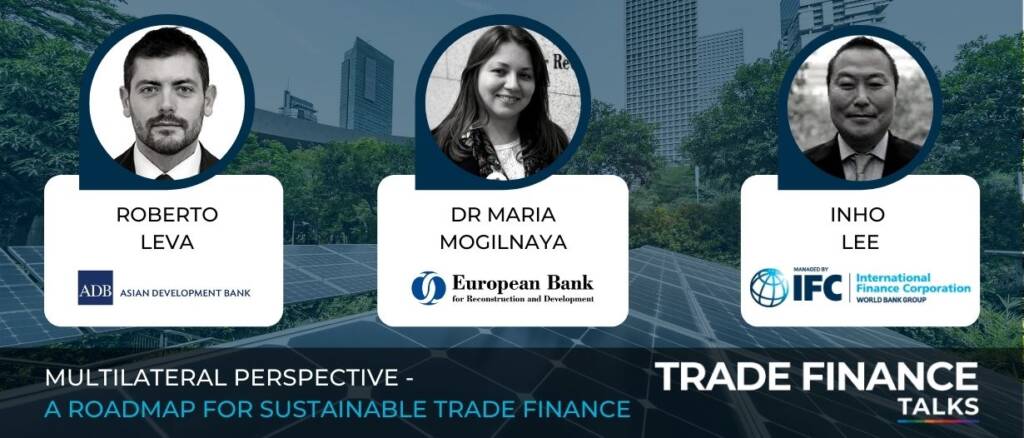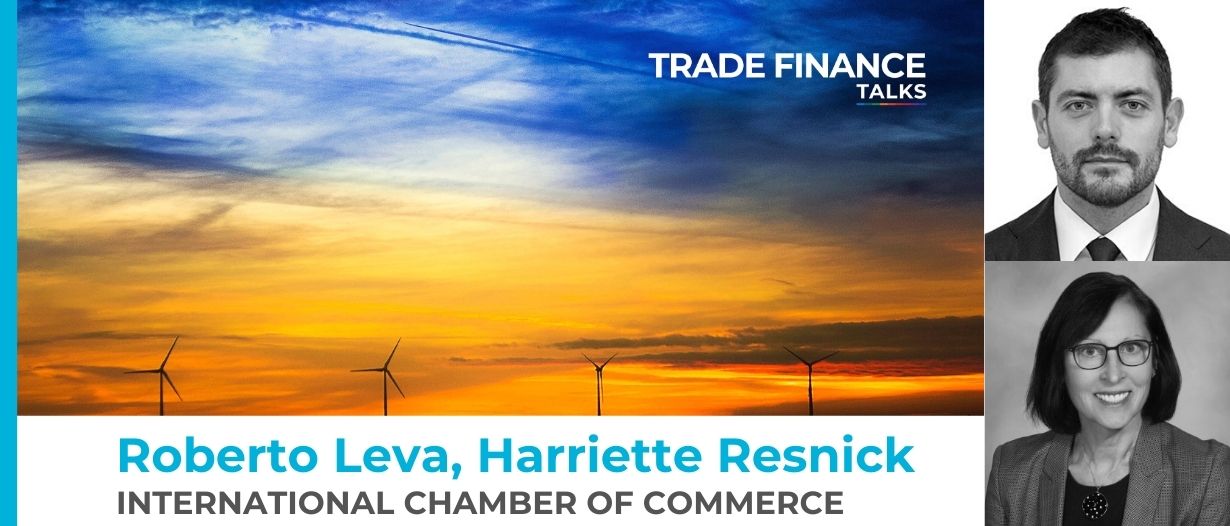The International Chamber of Commerce (ICC) Sustainable Trade Finance working group was established in 2016 to develop tools and best practice standards to promote sustainability across the trade finance industry. The members of the working group represent commercial banks, multilateral development banks and other trade and sustainability experts, which liaise with key regulatory and industry initiatives, including within ICC.

Established in 2018, the “Successors in Trade” (SIT) Programme aims at identifying and supporting an emerging generation of international trade finance experts. The SITs are aligned for one year to selected ICC initiatives, to provide new perspectives and ideas to the working groups and, at the same time, developing a network of contacts to help their engagement with the ICC.
As 2020 demonstrated all too clearly, the world was unprepared to respond to the health and economic consequences associated with the COVID-19 pandemic. The past year has revealed how quickly threats can escalate from local incidents to worldwide crises and how borders are no defence against the most serious of issues facing our international system.
With the recovery now underway, policymakers and business leaders must not lose sight of the enormous threats posed by social inequality, climate change, and biodiversity to global prosperity and resilience. Faced with these challenges, the International Chamber of Commerce recognises that business practices must preserve the social and environmental wellbeing of the planet and its people. Now more than ever before, businesses need to transition their operations to protect against future destabilising crises.
Trade can be a catalyst of sustainable business practices, but challenges still exist
Trade finance can play a key role in supporting this transition, while helping clients achieve long-term viability. By reducing the uncertainty between sellers and buyers, trade finance can help them to conduct their business in a sustainable and responsible manner.
To date, many banks have adopted a sustainability strategy for their trade finance products, and are incorporating environmental, social, and governance (ESG) criteria into their risk management processes. In addition, an increasing number of clients are requesting banks’ assistance in achieving sustainability goals.
Banks are tailoring products to meet these objectives, including providing financing of “green” projects related to renewable energy or waste reduction. Others have started offering contingent guarantee facilities or supply chain finance programmes that incentivise the borrower to meet sustainable performance objectives, by linking pricing to attainment of specific ESG targets.
However, substantial challenges remain before sustainability requirements can be fully integrated into practice. Among other barriers, insufficient data is available from clients on performance of their operations and supply chains against ESG criteria, and there is a lack of standards for reporting such data as well as a knowledge gap in ESG-related topics.
The International Chamber of Commerce’s 2020 Global Trade Survey reports that member banks would welcome the establishment of standards and guidelines to help them embed sustainability considerations into their processes. These standards and guidelines can help identify and promote best practices, improve access to reliable data across the market and define with greater certainty which trade assets are “sustainable.”

ICC focuses on sustainability in trade
To address these challenges, the working group has been developing tools and best practice standards to promote sustainability across the trade finance industry. The group is focusing its efforts in four work streams: process and principles, training, capital and incentives, and definitions, all of them working in coordination with other ICC Working Groups.
The process and principles work stream has helped to promote financial institutions’ use of the GMAP tool as part of their ESG due diligence process. GMAP is an online database that identifies high environmental or social risks associated with agricultural commodities, and integrates a database of available certifications. The workstream also collaborated with SWIFT to incorporate the ICC’s Sustainability Questionnaire for corporate clients into SWIFT’s KYC Registry, limiting the reporting burden on clients, who can now provide ESG-related data in a standard format to a central repository. Development of a comparable questionnaire for correspondent banks is underway.
The capital and incentives stream is exploring the connection between sustainable trade finance and potential incentives to scale up that asset class. It is currently developing a white paper that will examine the case for incentives such as capital relief and propose a framework for data collection through the ICC’s Trade Registry to enable assessment of the credit performance of trade transactions tagged as sustainable.
The definitions work stream is working to define the principles for and characteristics of sustainable trade finance, to provide greater guidance to the industry in structuring and identifying such transactions. It will also consider regulatory initiatives such as the EU Taxonomy as part of this effort.
Finally, the training work stream contributes to educating the industry by sourcing relevant online courses and participating in webinars on sustainability topics. The stream also distributes training materials and organises podcasts for stakeholders to learn about regulatory and industry developments and hear from subject matter experts.

ICC fosters the industry’s future sustainability champions
Financial institutions, corporates, investors, and governments must attract the right talent to envision and implement the long-term sustainable development the world needs. Social and environmental considerations are a key criteria for millennials and Gen-Z in choosing where they want to work, invest, and spend. Companies that embed these core values into their mission and how they do business will benefit in recruiting, as well as employee satisfaction. Best ESG practices are a competitive advantage.
Understanding this trend, and the need to attract and cultivate future leaders for trade, the ICC Banking Commission created the ICC Successors in Trade (SIT) Programme in 2018. Several SIT candidates are part of the Sustainable Trade Finance Working Group, bringing their unique perspective and skills to advance each work stream’s objectives. This experience can equip these bankers to share knowledge within their own institutions and thereby enhance the industry’s ability to support companies on their sustainability journey. The programme also grants emerging talent the opportunity to be part of this movement, by enabling them to contribute to industry initiatives and creating a forum for knowledge transfer and building professional networks. ICC’s SIT Programme thus prepares them to become the future leaders, and champions for sustainability, in the trade finance industry.

































